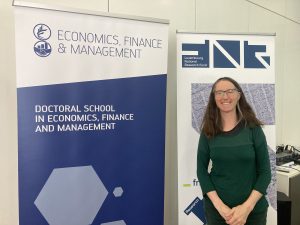On 6 May 2025, we were delighted to welcome Prof. Katrin Millock from the Paris School of Economics.
As part of our lecture series on Cross-Border Labor Mobility, Prof. Millock delivered an insightful lecture on “Migration as adaptation to climate change”.
In her lecture, Katrin Millock reviewed the economic tools that have been used to quantify so-called climate migrants and what are the important features that are not yet fully understood in quantifying the numbers of past and future climate migrants. She also discussed evidence on the many different mechanisms that can explain the links between the different manifestations of climate change and migration, such as asset destruction, health effects, and labour productivity effects. Each of these mechanisms requires some form of adaptation, such as air conditioning to reduce the health effects of heat waves, or crop switching or irrigation to mitigate the effects of rising temperatures on agricultural productivity. Katrin Millock discussed theoretical and empirical modelling of the interaction between migration and a main in situ adaptation technology for drought, irrigation.
Finally, as a case study, Katrin Millock discussed migration intentions in West Africa following drought. Katrin Millock and her co-authors draw on a new dataset on irrigation coverage with annual variation and combine it with fine-grained data on crop cover and weather to analyse individual migration intentions as expressed in the Gallup World Poll. The results suggest a moderating effect of irrigation on the likelihood of expressing migration intentions following drought, controlling for a rich set of individual and household characteristics and fixed effects, as well as additional time-varying regional controls. As such, it is an example of current research that aims to link migration with alternative adaptation strategies in order to gain a more nuanced understanding of the link between climate change and migration.
This lecture series is organized by Luxembourg Institute of Socio-Economic Research (LISER) and the Doctoral School in Economics, Finance and Management at the University of Luxembourg, in the framework of the Fonds National de la Recherche (FNR), Luxembourg funded project ACROSS and financing scheme RESCOM.
The next lecture series will feature Prof. Marco Tabellini from Harvard Business School and will focus on “Climate Matching in Migration”.
An event supported by the Luxembourg National Research Fund (FNR) (PRIDE19/14302992) and (RESCOM/2024/LE/18786706).

